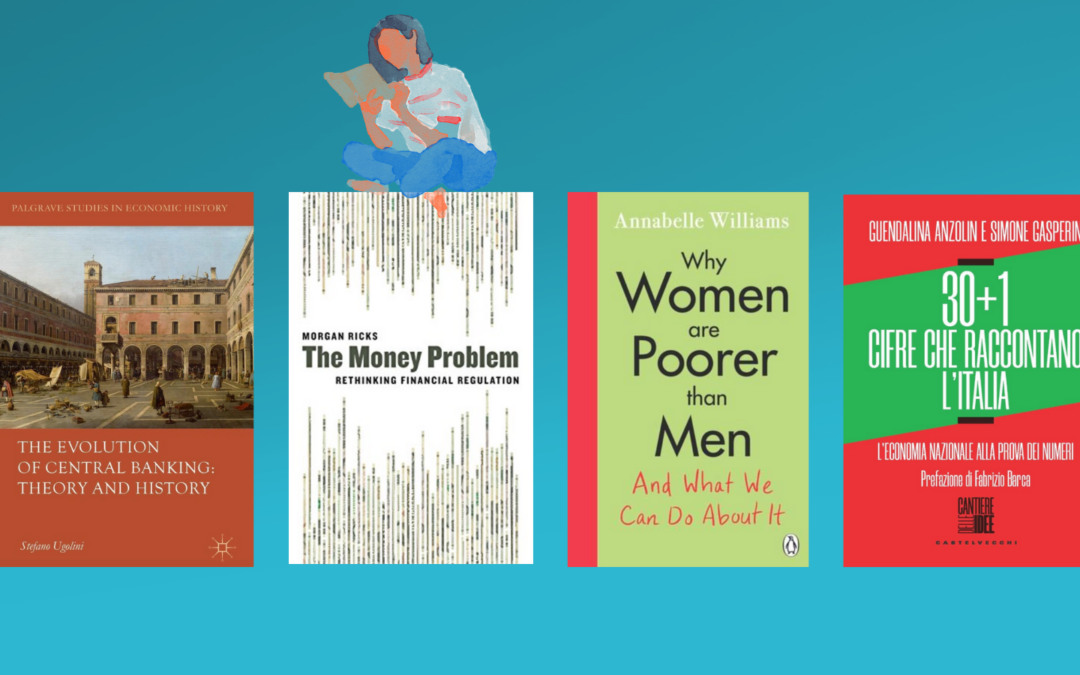Looking for some new reading recommendations this summer? You’re in luck! Our carefully curated list of books, explored by the Positive Money Europe team, covers a wide range of topics.
Dive into the world of central banks, explore a comprehensive analysis of the gender wealth gap or immerse yourself in the intellectual history of industrial policies in Italy.
Take a look and get inspired! Happy reading!
1) The evolution of central banking: theory and history, by Stefano Ugolini
This book provides one of the most detailed reconstructions of the evolution of central bank functions. By focusing not on the institutions that provided such functions, but the functions themselves, Ugolini goes back in time to study how different institutions, most of which have been defunct for a long time, provided the basic functions of: payment systems, supervision, lender of last resort, money issuance and monetary policy.
Why we liked it: Focusing on functions, instead of institutions, allows Ugolini to closely examine institutions that have been ignored by the central banking literature. It is a must-read for anyone interested in the historical roots of central banking.
2) The money problem, by Morgan Ricks
Morgan Ricks was a senior policy advisor in the US Treasury Department, forming part of the Crisis Response Team as the global financial crisis broke out. In this book, Ricks reflects on that experience, and magnificently explains what the shadow system is, how it increased financial instability and how a deep money reform can change that.
Why we liked it: Not only is this a great book to understand the global financial crisis and the role that shadow banking played in it, it also shows why central bank digital money can greatly reduce financial instability. We especially recommend this book to ECB economists worried about the financial stability consequences of a digital euro.
3) Why women are poorer than men… and what we can do about it, by Annabelle Williams
Journalist Annabelle Williams explores the various factors contributing to the gender wealth gap. This book explores the historical, societal and systemic reasons for women’s economic disadvantage, including wage disparities, unequal career opportunities and limited access to financial resources. Williams highlights the importance of addressing these issues to achieve gender equality and create a fairer economic system for all.
Why we liked it: Reading this book is worthwhile because it provides a comprehensive analysis of the gender wealth gap and its underlying causes. The book offers valuable insights into the complex dynamics that contribute to women’s economic disadvantage. It helps raise awareness about the issue and encourages readers to reflect on the importance of gender equality in financial matters. The author also offers potential solutions and strategies to bridge the wealth gap, making it an informative and empowering read for anyone interested in social justice and economic equality.
4) 30+1 Cifre che raccontano l’Italia: l’economia nazionale alla prova dei numeri, by Guendalina Anzolin & Simone Gasperin, with a foreword by Fabrizio Barca
On 16 May 1991, the Corriere newspaper headline read ‘Italy, Fourth Power’, as the country had just surpassed Great Britain in terms of per capita GDP. But what happened to the Italian economy in the 30 years since? GDP has actually decreased in real terms compared to 1990. Additionally, during this period, real wages have also experienced a decline. This brilliant book tells this story in 31 short and insightful analyses. Each number represents a different aspect of Italy’s recent history, offering a clear picture of the country’s economic, social and political challenges. It encourages readers to use the right tools to understand the complexities and avoid misleading simplifications.
Why we liked it: The book encourages active and well-informed engagement in the democratic process and the upcoming political choices that await us. It’s a must-read for anyone interested in Italy’s past and the decisions that shape its future!

